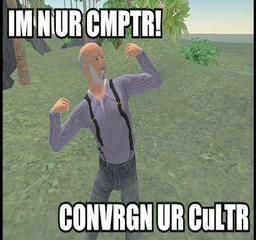
While I’ll be writing a longer review in response to Clay Shirky’s Cognitive Surplus: Creativity and Generosity in a Connected Age, one aspect of the book that really bothered me was the way he seemed so dismissive of ICanHasCheezburger. He calls the process of creating a LOLcat “the stupidest possible creative act” with the “social value of a whoopee cushion and the cultural life span of a mayfly.” He does, however, consider it to be an example of participatory culture — perhaps equal to Cartoon Network.

SHIRKY: But the interesting thing about lolcats, about these cute cats made cuter with the application of cute captions, is that when you see a lolcat, you get a second message which is: You can play this game, too. All right, when you see something on television, the message is: You could not do this, you can only consume this.
There is a giant gulf between doing something and doing nothing. And someone who makes a lolcat and uploads it – even if only to crack their friends up -has already crossed that chasm to doing something. That’s the sea change, and you can see it even with the cute cats.
But one aspect that Shirky does question — and that the New York Times gazes over in amazement (similar to the “weird Japan” newsreporting meme) is that someone is getting paid. But it is the owners of ICanHasCheezburger who are making seven figures (for the entire family of sites) — not those creating LOLcats, who receive merch for their creative output.
Shirky describes concerns about labor efforts in participatory culture (and thereby fan culture in general):
If ICanHasCheezburger.com, purveyor of lolcats, is a late-model version of the fifteenth-century publishing model, then the fact that its workers are contributing their labor unpaid is not only strange but unfair. But what if the contributors aren’t workers? What if they really are contributors, quite specifically intending their contributions to be acts of sharing rather than production? What happens if their efforts are an effort of love?
We here on The Learned Fangirl have discussed the labor/fan dynamic and are glad that it is being considered within the context of Cognitive Surplus — and will be addressing this issue head on in the followup book review. We’ll be discussing why Shirky not having an answer for his own questions above for both LOLcats and participatory culture is disappointing. At least this half of TLF will!



